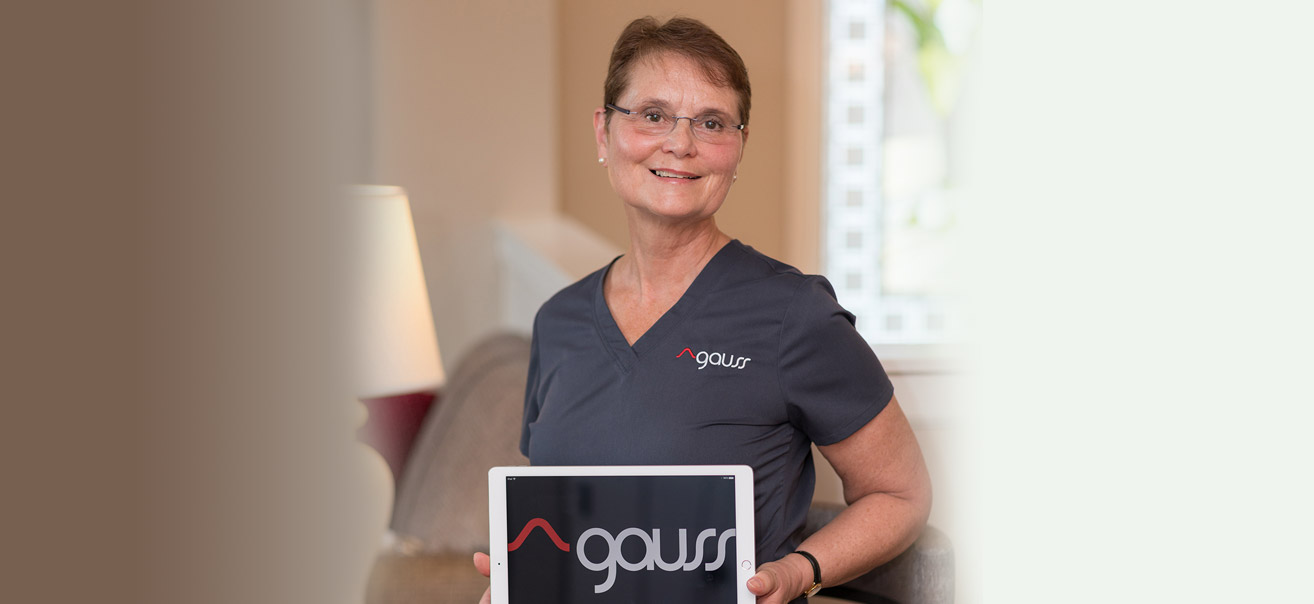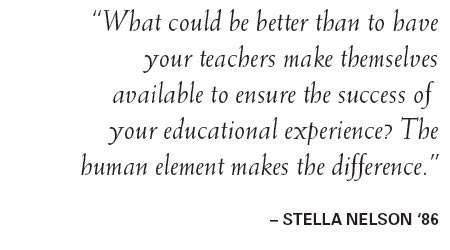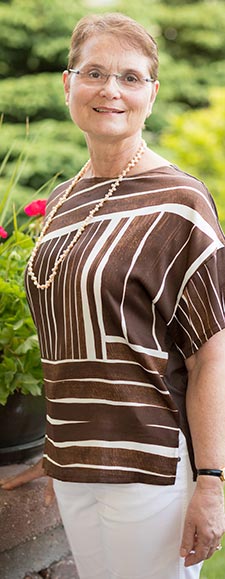
The app photographs surgical sponges to assess patient blood loss.
Stella Nelson remembers when procedures like gallbladder surgery required a large incision and recovery in the hospital.
The idea of outpatient laparoscopic surgery to accomplish the same goal seemed like science fiction.
But Nelson has made a career out of overcoming obstacles. She has helped refine technology to reduce medical errors in surgery and a system to monitor blood loss and thereby improve outcomes
during childbirth.
“If you’re not comfortable with change, you don’t belong in nursing,” said Nelson, who graduated from Bemidji State University
in 1986 with only the second group of students to complete a Bachelor of Science degree in nursing. She was 38 years old at the time.
Night classes and carpools
Before deciding to seek the degree, she was working as a licensed practical nurse in Bemidji while her daughter and son were young. A single remark from a colleague, a woman physician, changed her life.
“You could do what I am doing,” the doctor told her. A few weeks later, Nelson was enrolled at Bemidji State.
“I had been thinking about going back to school to become a registered nurse on and off for years,” she said, “It was that one little thing that tipped me over the edge.”
Nelson began taking English classes at night to fulfill her general education requirements. At that time, BSU did not yet have a nursing program, so when the time came, she carpooled to Thief River Falls two days a week with three other students until she earned an associate degree in nursing in 1984.
Conveniently for Nelson, her efforts aligned with the opening of the baccalaureate nursing being developed at BSU.
The new program was constantly breaking ground, she said, trying fresh approaches and providing highly relevant learning opportunities. After a visit to BSU a few years ago, Nelson noted that BSU’s “amazing and wonderful simulation lab” showed the program was still innovative.
 Nelson, who now lives in Woodbury, was quick to point out that while access to technology is crucial, the personal attention she received from BSU professors was even more important. She found teachers and mentors willing to share their experiences and knowledge.
Nelson, who now lives in Woodbury, was quick to point out that while access to technology is crucial, the personal attention she received from BSU professors was even more important. She found teachers and mentors willing to share their experiences and knowledge.
“What could be better than to have your teachers make themselves available to ensure the success of your educational experience?” she said. “The human element makes the difference.”
Nelson’s education and pioneering spirit prepared her to balance the “human element” of nursing with technology as her career evolved.
After graduating from BSU, Nelson worked as a surgical first assistant for Dr. Bruce Wilson at the Bemidji Clinic and learned the benefits of getting to know patients well. She saw them when they first came to the clinic, assisted during procedures and followed up with them after surgery.
Back to school for master’s
 Nelson returned to school, at the College of St. Scholastica in Duluth to earn a master’s degree in management in 1996. Throughout her studies, she did homework with her children at the kitchen table and looks back on those times with gratitude for her husband, Paul.
Nelson returned to school, at the College of St. Scholastica in Duluth to earn a master’s degree in management in 1996. Throughout her studies, she did homework with her children at the kitchen table and looks back on those times with gratitude for her husband, Paul.
“Fortunately, I have a husband who supported me and wasn’t afraid to use the vacuum and fill the dishwasher,” Nelson said.
After their children graduated and moved away, the couple moved to Chapel Hill, N.C., where she accepted a position as manager of the Ambulatory Surgery Center at the University of North Carolina Chapel Hill.
Stepping into consultant’s role
In 2001, Nelson became a project manager in the Surgical Services Division at UNC. She was part of a team that conducted a formal trial of a system using radio frequencies to detect overlooked surgical sponges in patients, thus minimizing potential errors from manual counting. The yearlong, 2,500-patient study resulted in no retained sponges.
In 2012, RF Surgical Systems of Bellevue, Wash., which developed the sponge-detection system, asked Nelson to join them as a consultant. She helped the company, later acquired by Medtronic, conduct further trials to refine and implement the technology. Also as a consultant, Nelson has spoken at national conferences to educate audiences about the potential impact of retained sponges on patients and medical facilities.
Her first clinical/technology collaboration led to her most recent opportunity. A former RF Surgical employee with whom she worked is now on the sale force of Gauss Surgical of Los Altos, Calif. This startup has developed an innovative blood monitoring system called Triton — essentially an iPad app that photographs used surgical sponges to estimate blood loss.
Prior to this FDA-approved system, doctors could only make an educated guess about blood loss, which affects recovery time and medication. Nelson said the new method enables more accurate, real-time analysis that may prove significant during childbirth, including vaginal delivery, Caesarean sections and other procedures where risk of blood loss can be high.
In her consulting role, Nelson works with engineers to identify clinical applications and potential problems, as well as contribute her “what if” ideas.
“As clinical support, we sit down with the engineers to see what the app is doing — what could be done to make it better,” she said.
Nelson enjoys the challenge of working with 20-something engineers who have never been in an operating room. They sometimes come up with cool ideas that would not be cool in a delivery room, she said. Likewise, she and other clinicians ask the engineers to find ways to make the method more user friendly.
“We challenge each other,” Nelson said.
Emphasis on communication skills
She credits her nursing degree at BSU with preparing her to thrive in work with cutting-edge technology. The in-depth education and insight into human physical and psychological systems informs her critical thinking to this day, she said.
She also is grateful to her English professors, particularly the late Margaret Thorbeck, for helping her hone her writing and communication skills — something she believes today’s students should make a priority.
“I was challenged to open my senses and develop greater critical-thinking skills,” Nelson said. “I learned to look beyond what was right in front of me.”
